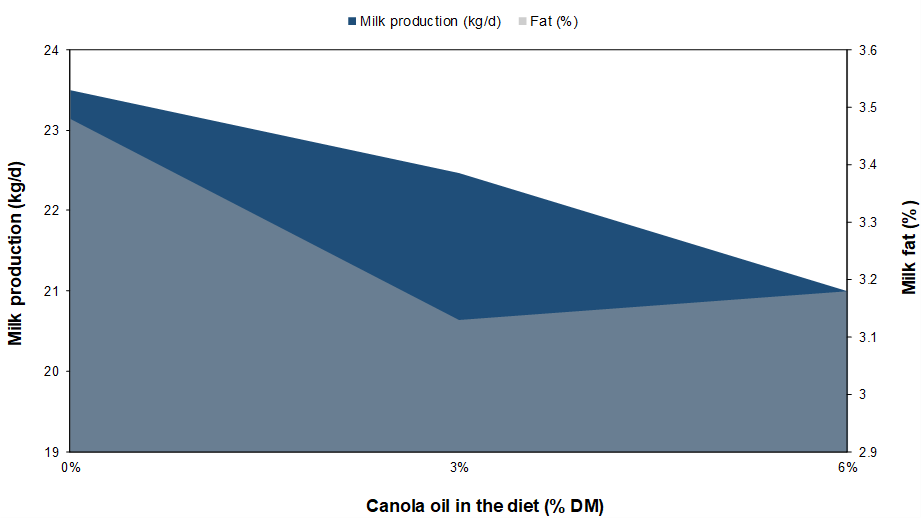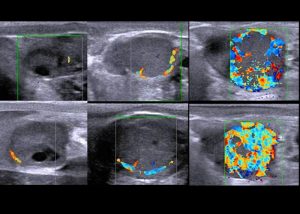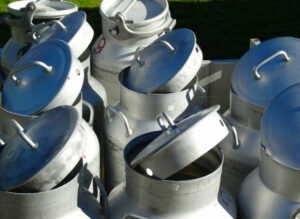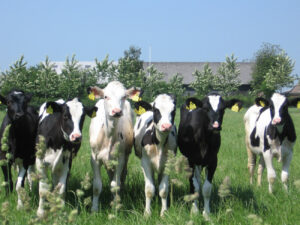Juan Sánchez Duarte & Fernando Díaz
Canola oil is a co-product derived from the solvent extraction of canola seed after it is mechanical crushed. Compared to other vegetable oils, canola oil has the highest concentration of unsaturated and monounsaturated fatty acids (Table). The addition of fat, such as canola oil, to lactating dairy cow diets is a common practice for increasing dietary energy density and improving milk production. However, high inclusion of canola oil may compromise feed intake, milk fat concentration, and milk production.
| Fatty acid (%)* | Canola oil | Soybean oil | Corn oil | Palm oil |
| C10:0 | 0.009 | – | – | – |
| C12:0 | 0.02 | – | – | 0.2 |
| C14:0 | 0.08 | 0.5 | 0.13 | 1.0 |
| C15:0 | 0.05 | 0.31 | – | 0.1 |
| C16:0 | 4.79 | 9.0 | 11.80 | 40.6 |
| C17:0 | 0.02 | 0.35 | – | 0.1 |
| C18:0 | 2.34 | 4.0 | 5.18 | 4.3 |
| C18:1 cis-9 | 57.92 | 23.7 | 20.66 | 38.0 |
| C18:2 cis-9 cis-12 | 17.22 | 50.3 | 53.99 | – |
| C18:3 n-3 | 7.49 | 7.21 | 1.0 | 0.30 |
| C18:3 n-6 | 0.53 | – | – | – |
| C20:0 | 0.01 | 0.03 | 0.2 | 0.4 |
| C20:1 | 1.31 | 0.20 | – | 0.1 |
| C21:0 | 0.009 | – | – | – |
| C22:0 | 0.29 | 0.35 | 0.12 | 0.07 |
| C23:0 | 0.02 | – | – | – |
| C24:0 | 0.19 | – | 0.40 | 1.3 |
| C24:1 | 0.09 | – | – | – |
| Saturated | 7.77 | 33.07 | 25.1 | 47.2 |
| Unsaturated | 91.69 | 83.8 | – | 52.9 |
| Monounsaturated | 66.45 | 38.72 | 26.8 | 22.50 |
| Polyunsaturated | 25.24 | 26.32 | 48.0 | 1.25 |
| Omega-3 | 7.49 | 2.30 | – | – |
| Omega-6 | 0.53 | 23.55 | – | – |
| *Total saturated, unsaturated, monounsaturated, and polyunsaturated fatty acids do not correspond to the sum of the single fatty acids as they are averages taken from different studies (Dohme et al., 2000; Oliveira et al., 2011; Giron et al., 2016; Kierończyk et al., 2018). | ||||
The addition of 2% vegetable oil [in a dry matter (DM) basis] into the diets of either, canola oil, peanut oil or sunflower oil did not affect intake in lactating cows; which was attributed to the lower portion of supplemented oil. However, milk production increased 0.9 kg/day in cows fed canola oil in comparison with cows that received peanut or sunflower oil. Milk fat concentration was similar between cows with any fat supplementation; however, fatty acid composition of milk fat was altered by oil supplementation. Cows fed plant oils reduced short-chain (C4:0 to C12:0) and medium-chain (C14:0 to C16:1) fatty acids in milk and increased the proportion of long-chain (C18:0) fatty acids in milk fat (Dai et al., 2011).
More recently, the evaluation of including 3.6% (on a DM basis) of canola oil in corn- and wheat-based diets altered milk production and milk fat concentration in cows fed only at 90% of ad libitum intake (Alvares-Hess et al., 2019). Cows receiving a corn-based diet with canola oil produced 2.8 kg/d more milk than cows fed wheat-based diets or corn- and wheat-based diets without canola oil supplementation. Milk fat concentration; however, was lower in cows that received corn- and wheat-based diets supplemented with canola oil. This depression in milk fat content was likely caused by a reduction in fiber digestibility in the rumen or by the modification of fatty acids in the mammary gland as a consequence of adding long-chain fatty acids to diets rich in starch.
Although canola oil can improve milk production, and to some extent, the profile of fatty acids in milk, the level of oil inclusion into the diet must be considered. Increasing canola oil in lactating cow diets from 0 to 6% (on a DM basis) decreased milk production and milk fat concentration (Welter et al., 2016). Maximum reduction of milk fat concentration occurred when 3.0% of canola oil was include in the diet (Figure below). It was reported a reduction of 0.13 kg/day of milk in cows supplemented with 6% canola oil compared with cows fed diet without canola oil. On the other hand, the inclusion of 6% canola oil in the diet stimulated the concentration of omega-3 fatty acids in milk.
 In conclusion, canola oil is a good source of fat for increasing energy density of dairy cow diets. Canola oil can increase milk production and concentration of healthier fatty acids in milk. However, inclusion rate of canola oil in the diet must be taken into account as it has been demonstrated that inclusion levels greater than 3.6% on a DM basis may reduce milk production and milk fat concentration. Other factors such as cost, availability, handling, and blending must be considered before decide including canola oil in dairy cow diets.
In conclusion, canola oil is a good source of fat for increasing energy density of dairy cow diets. Canola oil can increase milk production and concentration of healthier fatty acids in milk. However, inclusion rate of canola oil in the diet must be taken into account as it has been demonstrated that inclusion levels greater than 3.6% on a DM basis may reduce milk production and milk fat concentration. Other factors such as cost, availability, handling, and blending must be considered before decide including canola oil in dairy cow diets.
References
- Kierończyk, M. Rawski, A. Józefiak, J. Mazurkiewicz, S. Świątkiewicz, M. Siwek, M. Bednarczyk, M. MałgorzataSzumacher-Strabel, A. Cieślak, A. Cieślak, A. Benzertiha, D. Józefiak. 2018. Effects of replacing soybean oil with selected insect fats on broilers. Animal Feed Science and Technology. 240:170-183.
- D. Oliveira, N.C. Baião, S. V. Cançado, B. L. Oliveira, Â.M.Q. Lana, T. Ch. Figueiredo. 2011. Effects of the use of soybean oil and animal fat in the diet of laying hens on production performance and egg quality. Ciência e Agrotecnologia. 35:995-1001.
- Dohme, A. Machmüller, A. Wasserfallen, M. Kreuzer. 2000. Comparative efficiency of various fats rich in medium-chain fatty acids to suppress ruminal methanogenesis as measured with RUSITEC. Canadian Journal of Animal Science. 80:473-484.
- E.P. Giron, M.L.P. Restrepo, J.E.C. Fornaguera. 2016. Supplementation with corn oil and palm kernel oil to grazing cows: ruminal fermentation, milk yield, and fatty acids profile. Revista Brasileira de Zootecnia. 45:693-703.
- C. Welter, C.M. de M.R. Martins, A.S.V. de Palma, M.M. Martins, B.R. dos Reis, B.L.U. Schmidt, A.S. Netto. 2016. Canola oil in lactating dairy cow diets reduces milk saturated fatty acids and improves its omega-3 and oleic fatty acids content. Plos One. 11(3):e0151876.
- S. Alves-Hess, S.R.O. Williams, J.L. Jacobs, M.C. Hannah, K.A. Beauchemin, R.J. Eckard, W.J. Wales, G.L. Morris, P.J. Moate. 2019. Effect of dietary fat supplementation on methane emissions from dairy cows fed wheat or corn. Journal of Dairy Science. 102:2714-2723.
- Kostik, S. Memeti, B. Bauer. 2013. Fatty acids composition of edible oils and fats. Journal of Hygienic Engineering and Design. 112-116.
- J. Dai, C. Wang, and Q. Zhu. 2011. Milk performance of dairy cows supplemented with rapeseed oil, peanut oil, and sunflower seed oil. Czech Journal of Animal Science. 56:181-191.
- J. Dai, C. Wang, Q. Zhu. 2011. Milk performance of dairy cows supplemented with rapeseed oil, peanut oil and sunflower seed oil. Czech journal of Animal Science. 56:181-191.
© 2019 Dairy Knowledge Center, LLC. All Rights Reserved.











